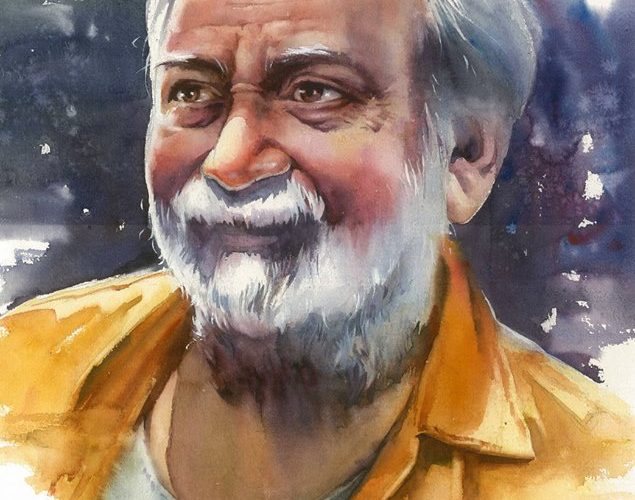Chalam (1894-1979), a Telugu writer of twentieth century, was born on 19th May 1894, marking this May 19th as the 125th birth anniversary.
His novels, short stories, plays, sketches, poetry, translations, and an autobiography, reflect a poignant process of expression for the emancipation of the women, and resonate with passionate appeal.
In this below play, the writer Chalam, after his death, is in a conversation with Yama, the Lord of the Death.
This translation of “Yamudi Mumdu Chalam” is presented by Jagaddhatri, a bi-lingual writer, translator, and columnist, to commemorate the 125th anniversary year of the birth of the writer Chalam.
*
Chalam: Who’s it? Yama?
Yama: Yes.
Chalam: Are you there? I thought you are not.
Yama: You didn’t think. You thought that you thought.
Chalam: People of all religions, must they come here?
Yama: Those who believe in Yama.
Chalam: What about the rest?
Yama: As per their belief.
Chalam: If there’s no belief at all?
Yama: Nothing is there for people who don’t believe in anything.
Chalam: What if some people don’t believe in life after death?
Yama: It ends up with death.
Chalam: I too don’t have that belief! Like many nowadays.
Yama: It’s not enough to say you do not have. Will not suffice if you write in books. That lack of belief must come truly and doubtless. It is entirely different for those nob-believers. Anyway beasts have no issues with belief. Death is the end for them. For a man who thinks that death is the end, will not have that stance on life. Those writings, isms, those loves and hates, nothing will remain and work. You believe what you said is victory. What are all those? Where is the Truth when everything in the world burns into ash every minute?
Chalam: But the progress of mankind, to open the eyes to truth…
Yama: What mankind? Who knows after ten years the world will be there or not, why that belief? Why do you hope that it will learn the truth?
Chalam: So you mean that there is no other world for the one who does not believe in all this and lives a selfish life?
Yama: Of course, there is another world for a selfish person, since he is living for some purpose.
Chalam: Then who does not have?
Yama: Every one has a next world, in a different way.
Chalam: I never believed in Yama.
Yama: Then why did you query whether I am Yama? Why have you thought that I am Yama?
Chalam: I thought you may be.
Yama: That’s why I became so.
Chalam: Perhaps Hadn’t I thought that way.
Yama: Then, I am not Yama.
Chalam: Who you would be, then?
Yama: Who so ever you suspect me to be.
Chalam: Afterwards –
Yama: Who ever you think so that is me.
Chalam: I do not think anything.
Yama: Don’t lie (laughs) shall I tell? You are now thinking what it would be for you, Hell or Heaven?
Chalam: I don’t believe in heaven and hell.
Yama: All that’s okay, in the books on earth. But here, seeing me had you thought of heaven and hell, or not.
Chalam: Knowing you to be Yama, wasn’t it natural to think that way?
Yama: Yes. That’s why it is the truth.
Chalam: It’s ok, then tell me–heaven or hell?
Yama: If I am Yama then it’s automatically hell for you!
Chalam: I never believed in hell at all.
Yama: Of course not. But do you believe that all your imaginations, writings, works will bring any change in the world? After all you too are from the same world.
Chalam: Can’t it be heaven?
Yama: Could be — but you chose hell.
Chalam: When?
Yama: Just now. That means throughout your life.
Chalam: What does that mean?
Yama: Present is always the consequence of the past. If you believe that a deed will have some result, then only there would be a result. For that matter no deed would be without result. The remaining results are to be experienced here.
Chalam: If there is no such belief at all …
Yama: Without that belief, there’s neither heaven nor hell. But who would be doing deeds not leading to results?
Chalam: Why in the first place, I thought you to be Yama and this place as hell is because of my die-hard childhood fears and habits, that’s all–not because I believe in.
Yama: Then what did you have faith in?
Chalam: I said I do not know anything.
Yama: OK, then you will learn now.
Chalam : What will I learn?
Yama: Whatever you wanna learn that.
Chalam: I want to learn that there’s nothing to learn.
Yama: That’s what you will learn, in the hell.
Chalam: Then why this punishment?
Yama: As the result of your immoral deeds.
Chalam: Now you are up to the point. Tell me, what is morality and what is immorality?
Yama: Do you know?
Chalam: I do not know but I argue with people who say they know.
Yama: I know your arguments.
Chalam: Have you read my books?
Yama: Why, I am reading you now.
Chalam: I have changed many times.
Yama: With all those changes I am reading you thoroughly.
Chalam: Then tell me what does morality mean!
Yama: Whatever you say it is.
Chalam: Then why punishment for me?
Yama: Because you have behaved against your line of morality many times, isn’t?
Chalam: Yes but my ideal is very great.
Yama: But you have wronged your ideal morality. This hell is the resultant effect of it.
Chalam: It is easy for people to live morally, without any ideal, to take it from the scripts and people’s sayings.
Yama : Yes
Chalam: For them then?
Yama: Heaven.
Chalam: Heaven? Why so?
Yama: Because they lived morally. For they do not carry any guilt in their minds.
Chalam: Oh is it enough, if there is no guilt. Then is there no crime to consider, at all?
Yama: Isn’t that you wrote all these days? There are no sin and virtue. It’s the mind that imagines all these, their conscience is the real judge for every one.
Chalam: So then minds are the cause of heaven and hell?
Yama: Yes that’s it, these are the words penned by you only. So you don’t believe in what you have written.
Chalam: Then what about the God who decides upon this?
Yama: God is also the same, if you want he is there and if you don’t he is not.
Chalam: Then who is the one who determines all this?
Yama: It’s you yourself.
Chalam: Then what about the rest of the people?
Yama: They decide for themselves.
Chalam: Then what about you?
Yama: As I told you, if you think I am there, then I am!
Chalam: All this is very atrocious.
Yama: What?
Chalam: If you believe in the non-existent God in heaven, is it then heaven is the reward?
Yama: Haa, Yes.
Chalam: The false bhaktas, fools, and worms like wicked people all I have seen, for them…
Yama: They too get the heaven, they wish for and there would be the God they worship.
Chalam: For the bhaktas of Vishnu?
Yama: Vaikuntham.
Chalam: Oh what a fool I was. If I too had believed in a God…
Yama: No chance? You cannot believe. Even now it’s not late. If you wish strongly you can go to Vaikuntham. But soon you would be wishing to go to hell.
Chalam: Why?
Yama: For you cannot bear that. Your character is such, you see.
Chalam: What do they do in Vaikuntham?
Yama: Whatever the bhaktas want to do that only.
Chalam: Bhajan! Dogmatic bhajan.
Yama: Yes can you put up with all that?
Chalam: Will they too?
Yama: (laughing) Thinking it to be a great thing people worship in your world. ‘Take us in to your presence, we don’t need anything more’ they say. But all needs remain. They go to Vaikuntham. Day and night they perform bhajan! Bhajan only.
Chalam: It is peace for them.
Yama: They think so. That bhajan and the presence of Vishnu would give them peace, for pretence they choose worship. But unable to live in that they suffer.
Chalam: What about people who have sweetness of devotion?
Yama: No problem for them. But how many such people are there? Umpteen people wish for heaven–but how many of them know what do they need exactly there?
Chalam: What will happen to them then!
Yama: They will grope like this until they find what they need.
Chalam: But, they punish in the hell isn’t it!
Yama: Who said so? All that you wish for, is in the hell. That’s why you are going there. We don’t torture, it’s you who torture yourselves.
Chalam: Why do I punish myself?
Yama: Why did you do so on the earth? Here too it’s the same.
Chalam: But here I have everything I need!
Yama: That’s the pain. Having everything you want is the problem. And they do not leave you for good. Like the bhajans in the heaven imagine, your books, your dreams …
Chalam: Then what’s the difference between that world and this world!
Yama: This is the world where efforts, hopes give success. All that’s which is left over from there.
Chalam: What would happen to me after this period of hell?
Yama: Whatever you wish to become so.
Chalam: If I do not think anything?
Yama: Nothing then, but you cannot stay without thinking.
Chalam: If I think I should roam with the apsarasas …
Yama: Why then, even now too you can have a go, if you wish so, but there lies peace and pleasure is the misconception of people, their mind accompanies all the way.
Chalam: I do not understand at all its confusing.
Yama: It’s so, these births, no one is forcing upon you.
Chalam: Then truth, justice, format, progress…
Yama: All those exist. But not as narrowly as you think. Values exist. But they will not be visible to you. What do they get from life, living selfish and cruel? For the one who empathizes with others tears, how does the world know about the sweetness of one sated smile? What happens outside is not the matter. Once you develop a sync between the external and internal then you gain more equanimity.
Chalam: Then what about the seers and savants, and yogis, who endeavor to seek deliverance from this cycle of birth and death? Are all they fools?
Yama: They really want to live more. If they do not want sincerely, it takes a jiffy to escape from this birth and death. Unable to bear the problems they created for themselves, seeking liberation, they worship and do sadhana that’s it.
Chalam: They say eeswara is the abode of joy, and the soul is the epitome of bliss, what about it?
Yama: If some one desires pure bliss, independent from everything, the very moment the same would be available.
Chalam: Then why don’t the people seek that supreme bliss?
Yama: Because they don’t need it!
Chalam: Why don’t they need it?
Yama: Tell me, why you don’t need it?
Chalam: Why don’t I need? It’s because you don’t find it.
Yama: Why is it not available? You should ardently wish for it single minded, that’s all, really think once. When ‘bliss’ is thought of, what does your mind wish for? Shall I get your books? That same joy you will get in abundance in here! Until you wail that you do not need such pleasure.
Chalam: Who will listen to my wails?
Yama: None else but you.
Chalam: So what then if I listen?
Yama: You listen and opt for another kind of happiness.
Chalam: Then?
Yama: It will be bestowed on you. That’s all, forever it is so. Wishing for something people wail and curse God for having given it or otherwise, they curse God, destiny, and the world for it. People get whatever they wish for ardently. Can you think of something else that’s more benevolent? Go now, all of them are waiting for you.
Chalam: Who?
Yama: Heroines of your stories. The ideal persons whom you wished ardently, imagined and gave them flesh and blood.
Chalam: Oh no!
Yama: (laughing) See, your hell started here itself.
Chalam: Can’t you allow me to go to heaven?
Yama: No objection at all, but it is teeming with sages and bhajan groups.
Chalam: Women too?
Yama: Yes, there are Rajaylaskhmis, Kantham, Hrudayeswaris, Sachitas. !
Chalam: No, no, then, I would to go to hell itself.
Yama: I know that well! Means you too know that, isn’t it!
Vaikuntham: Abode of Lord Vishnu as per Hindu mythology.
! Notable women characters of romantic movement (bhava kavithvam) in Telugu literature.
Telugu Original – Chalam
English Translation – Jagaddhatri
Chalam painting: Moshe Dayan









Nice..mam!